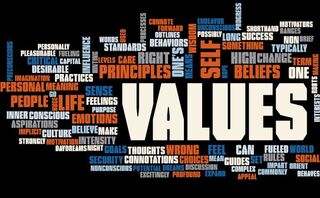Empathy
Values 101
Rethinking your values for 2020.
Posted December 27, 2016 Reviewed by Jessica Schrader

The term “values” is shorthand for hinting at complex levels of imagination. It ranges from one’s dreams and their roots in unconscious night processes to more preconscious daydreams and conscious aspirations. Values are potential capital fueled by hope and the motivation to expand and go forward.
Values are words commonly used to mean beliefs, but values are typically nonconscious and implicit motivators. They fuel emotions, feelings, thoughts, and behaviors. Their appeal to one’s self-interests is profound, if not excitingly pleasurable. Making progress in life is a massive endeavor. Values connote practices because one’s values strongly influence how one behaves.
Values serve self-expansion and fuller self-actualization. The drives within one's values can propel self-transcendent recognition—what I term "empathetic identification." This transpersonal embrace, rooted in visceral sensation, may flower into the virtues made noble, for example, in art and spiritual impulses.
Values are personally chosen beliefs, firm, not rigid convictions. Values can be positive, constructive, and health-promoting, or harmful, destructive, and unhealthy.
Values are something you care about—a lot.
Values can “change the world." Values measure what people feel are desirable, vital, useful, and worthwhile. They influence the direction of how we feel, think, and make choices; and how we perform and behave.
Values have transformative energy. As aspirations, values create visions for the future. Grasping one's values consciously, people become self-leaders. As self-activists, their living example is "larger than life" both to themselves and others, thus easing value performance in real time.
The transformative capacity of having values means the power to “change your inner world,” your construal of inner thoughts and feelings, and how you make sense of the environment of people and social events. Your values shape—for better or worse—good behaviors that improve the lives of everyone around you. Values are what you feel and believe to be true, your accumulated wealth of aspirations. Core values are one’s festival of knowledge, understanding, and wisdom—living a life of vitality.
Values differ from “principles.” Values are personal beliefs and opinions with a less precise universal “right-wrong” meaning. Values offer one a sense of general guidelines.
Principles, by contrast, are more socially planned. They are universally recognized as real standards. Typically, people perceive them as valid rules and laws with more unambiguous right-wrong connotations. People choose and may change their values but abide by conventional, more externally imposed principles of social propriety.
Principles are clear-cut, explicit constraining rules and codes of conduct that guide choices of governing right and wrong behaviors. Principles determine what is proper and structure moral evaluations and legal systems. Principles are rooted in values, often standardized in professional ethical codes.
By adulthood, people have formed their personalities.
A personality is a system, a personalized self-culture with a set of values. It is “how I operate.” These personal operating standards are guidelines and act as a compass, an orientation that designs and guides life. A “values statement” guides a person's life or self-culture: the values held most relevant and meaningful. “High-critical importance” means that a goal has long-term effectiveness decisive to success. Values are goals one aims to achieve and sustain.
Values, an integrated mix of beliefs and practices, are fueled by emotions. High-intensity emotions accompany values considered most important. High intensity imparts mega-force strength and persistence to valued beliefs.
When adults have a set of high values, even if merely an essential few, they have a sense of optimism. This creates a feeling that something desirable will happen. If one remains conscientious in the face of life’s inevitable “interferences,” one counters dispiritedness and offsets feeling demoralized—giving up. This fact is the “value” of values. Individually inspired values humanize us as persons heralding one flag—our common humanity.
Examples of individually inspired, healthy values include a long list:
- Safety and survival
- Self-development
- Balanced life
- Confidence
- Self-discipline
- Creativity
- Family
- Relationships
- Emotional security
- Fulfillment
- Patience
- Forgiveness to self and others
- Gratitude
- Health
- Peace of mind
- Happiness
- Self-care/hygiene
- Grooming
- Integrity
- Being accountable
- Financial security
- Freedom
- Self-reliance
- Interdependence
- Service
- Non-violence
- Occupation
- Helpfulness
- Sharing
- Perspective-taking
- Flexible co-operativity
- Empathy
- Compassion
- Non-kin loving-kindness
- Success
- Personal truth
- Wisdom
- Spiritual refinement
What are your values—now, for 2020, and beyond?




